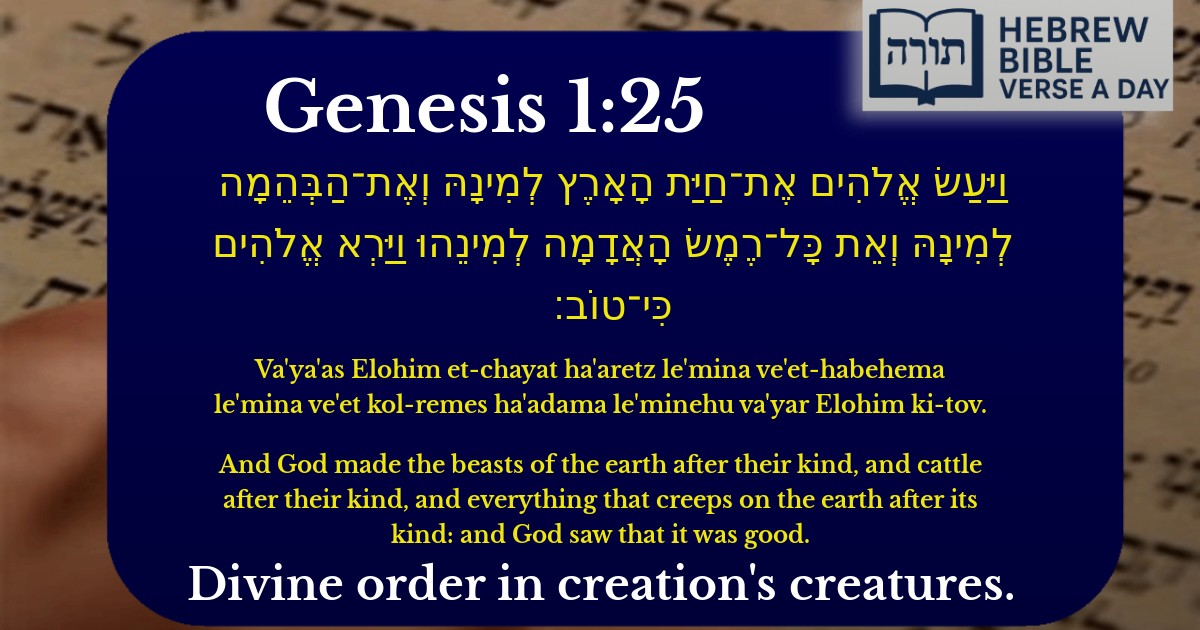Join Our Newsletter To Be Informed When New Videos Are Posted
Join the thousands of fellow Studends who rely on our videos to learn how to read the bible in Hebrew for free!
Hebrew Text
וַיַּעַשׂ אֱלֹהִים אֶת־חַיַּת הָאָרֶץ לְמִינָהּ וְאֶת־הַבְּהֵמָה לְמִינָהּ וְאֵת כָּל־רֶמֶשׂ הָאֲדָמָה לְמִינֵהוּ וַיַּרְא אֱלֹהִים כִּי־טוֹב׃
English Translation
And God made the beasts of the earth after their kind, and cattle after their kind, and everything that creeps on the earth after its kind: and God saw that it was good.
Transliteration
Va'ya'as Elohim et-chayat ha'aretz le'mina ve'et-habehema le'mina ve'et kol-remes ha'adama le'minehu va'yar Elohim ki-tov.
Hebrew Leining Text
וַיַּ֣עַשׂ אֱלֹהִים֩ אֶת־חַיַּ֨ת הָאָ֜רֶץ לְמִינָ֗הּ וְאֶת־הַבְּהֵמָה֙ לְמִינָ֔הּ וְאֵ֛ת כׇּל־רֶ֥מֶשׂ הָֽאֲדָמָ֖ה לְמִינֵ֑הוּ וַיַּ֥רְא אֱלֹהִ֖ים כִּי־טֽוֹב׃
וַיַּ֣עַשׂ אֱלֹהִים֩ אֶת־חַיַּ֨ת הָאָ֜רֶץ לְמִינָ֗הּ וְאֶת־הַבְּהֵמָה֙ לְמִינָ֔הּ וְאֵ֛ת כׇּל־רֶ֥מֶשׂ הָֽאֲדָמָ֖ה לְמִינֵ֑הוּ וַיַּ֥רְא אֱלֹהִ֖ים כִּי־טֽוֹב׃
🎵 Listen to leining
Parasha Commentary
📚 Talmud Citations
This verse is quoted in the Talmud.
📖 Chullin 60a
The verse is referenced in a discussion about the creation of animals and their categorization, emphasizing the divine order in creation.
📖 Berakhot 39b
Mentioned in the context of blessings over different kinds of food, relating to the diversity of creation as described in the verse.


Creation According to Their Kinds
The verse states that God created the animals of the earth, cattle, and creeping creatures each "after their kind" (לְמִינָהּ). Rashi (Bereshit 1:25) explains that this phrase emphasizes that each species was created with its own distinct characteristics and reproductive boundaries, ensuring they would not intermingle with other species. This reflects the divine wisdom in maintaining order in creation.
The Significance of "God Saw That It Was Good"
The concluding phrase, "and God saw that it was good," is analyzed by the Rambam (Moreh Nevuchim 3:13) as indicating that each creature fulfills its intended purpose in the divine plan. The Midrash (Bereshit Rabbah 9:4) further elaborates that "good" signifies harmony—each species exists in balance with the others, contributing to the stability of the world.
Distinction Between Beasts, Cattle, and Creeping Creatures
Divine Order and Human Responsibility
The Talmud (Chullin 60a) derives from this verse that all creatures were created with a purpose, and humanity must respect their boundaries. The Sforno (Bereshit 1:25) adds that recognizing the goodness in creation leads to gratitude and ethical stewardship, as humanity is entrusted with preserving the natural order established by God.